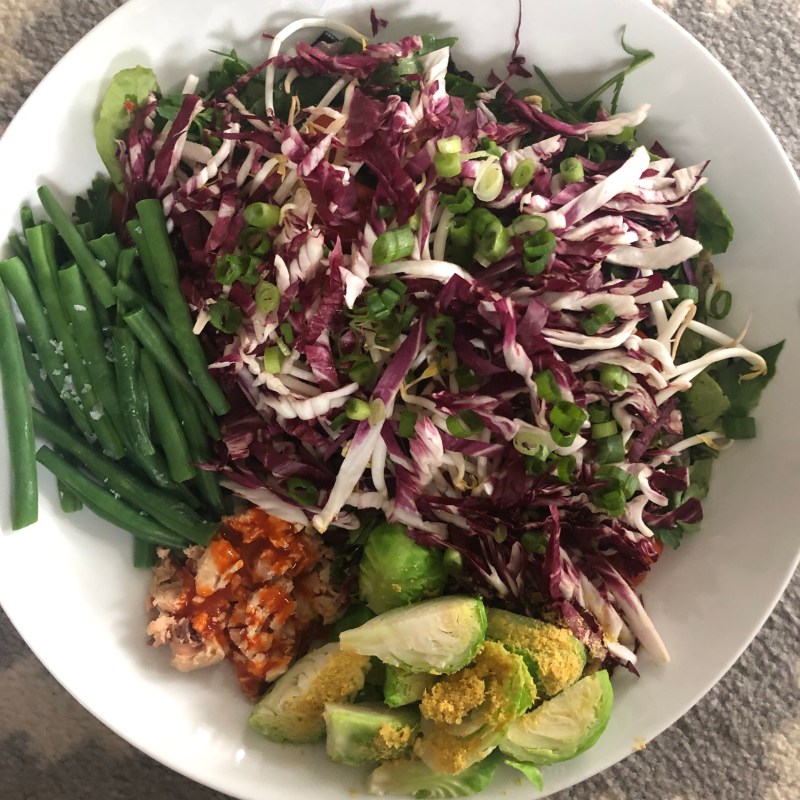Is it a food sensitivity or a food allergy? (or a food intolerance??)
Every time you take a bite of food, your body has a reaction.
Many of these are normal and essential— you need foods to signal the release of enzymes and other chemicals in order for the digestion process to take place.
But, there are other types of reactions that can be destructive: food allergies and food intolerances. This ties in the concept of oral tolerance.

Food Allergy
If you have a ✨FOOD ALLERGY✨, your immune cells have recognized a particular portion of a food as harmful and have produced a specific antibody to combat that food. Once the body has identified a food allergen, the immune cells will produce immunoglobulin E (IgE) antibodies each time it’s eaten.
🛑 90% of all IgE food allergies in the U.S. can be attributed to 8 food groups: milk, eggs, fish, shellfish, wheat, soy, peanuts, and tree nuts.
Food Sensitivity
Your immune cells can produce other types of antibodies such as IgG, IgM, and IgA in response to specific foods. This is considered a ✨FOOD SENSITIVITY✨.
These non-IgE-related food sensitivities are far more common; and far less understood. Food sensitivity testing is not as reliable, and cross-reaction among food substances is difficult to discern. 😩
Food Intolerance
A ✨FOOD INTOLERANCE✨ is a delayed and undetected food reaction. It does not directly involve the immune system secreting antibodies, but may cause the immune cells to get activated indirectly. Intolerances are usually due to the body not being able to process a component of a particular food. (For example: lactose intolerance due to lack of the enzyme lactase).
Food intolerance likely means you are lacking an enzyme, nutrient, or organism that is needed to properly digest or metabolize a substance. Common intolerances to food substances include amines in fermented foods, phenols in food additives, fructose from fruits, and glutamate in MSG.
Symptoms of food intolerance can be almost anything: brain fog, mood issues, bowel problems, weight gain, insomnia, joint and muscle pain, and more.

Determining Food Sensitivities, Food Allergies, and Food Intolerances
Lab tests for food sensitivities and intolerances are largely unreliable. Particularly if you have an autoimmune disease or a leaky gut, you may find tests show a LARGE amount of frequently eaten foods as “potential sensitivities”. The gold standard for determining your own individual tolerance is an elimination diet and reintroduction period.
An Elimination Diet helps you take potential allergens out of your diet, and then systematically reintroduce them to pinpoint exactly WHICH foods are contributing to symptoms. Yes, it takes a LOT more work and diligence; BUT you get significantly more personalized information for crafting a nutrition strategy that best works for you.
Not sure how to start? I got you. I wrote The Elimination Diet Guide to walk you through exactly how to do an Elimination (including phases of which foods to limit, which foods to reintroduce).
Get The Elimination Diet:

Want a free resource for increasing PHYTONUTRIENTS in your diet and supporting Liver Detoxification?
Click here to get the Phytonutrient Spectrum Guide by the IFM curated by Dr. Deanna Minich.

Want to work with a functional nutritionist to personalize your diet? Struggling with hormone imbalance, IBS, weight gain, mood changes? Let’s look at FOOD FIRST. Read more about Functional Nutrition at The Facility here.
Click here to schedule a free 15 minute phone consult with Kate!
- All Post
- Adventure
- Movement
- Pregnancy
- Recipes
- Research
- Shopping
- Travel
- Wellness

My tips for consuming adequate calories while breastfeeding.

An account of my experience in labor and delivery -- a positive hospital birth.

A dairy-free breakfast made with basmati rice, oat milk, and maple syrup.

A Functional Nutrition Perspective on managing nausea, food aversions, and appetite change in the first trimester.

This easy chocolate banana pudding is made with clean, dairy-free vegan ingredients and cooks on the stovetop in under ten...

An overview of Histamine Intolerance from a dietary perspective. What it is, how to manage it, and what it means...





2 Responses